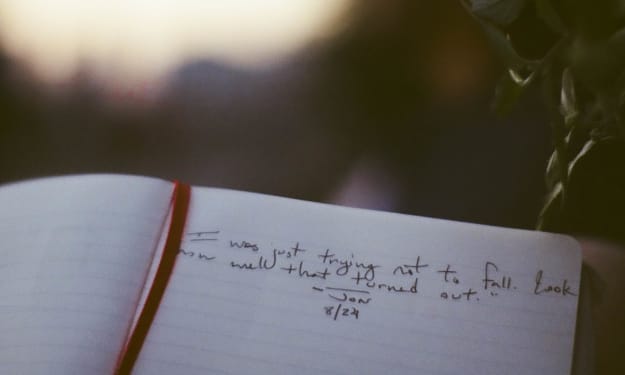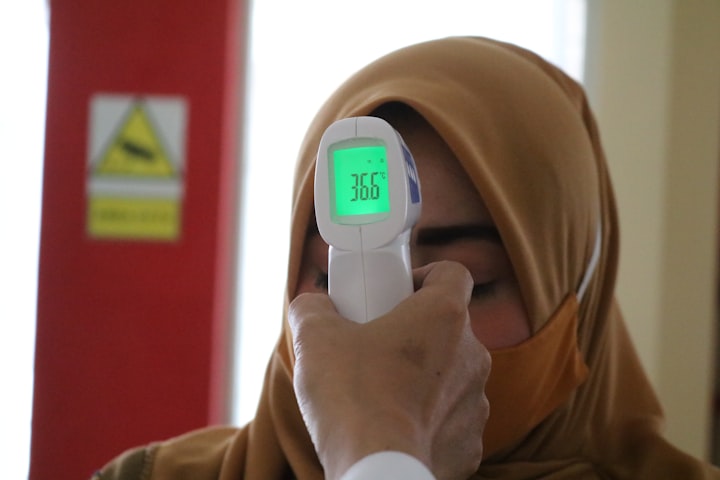A Promise of Improved Replies
As someone who has always prided herself on her independence, it was near impossible to give in to the reliance of a committed relationship.

The first time Jon called me nurturing, my heart shriveled like a grape left to dry. I felt my intestines inside my body as if someone were unraveling them to be placed in front of me to see. All my vulnerabilities, my softness, all my feminine tendencies that I had worked so hard to suppress in favor of a tough rind over my heart, they were all exposed and very much so real, no longer hidden. I sat on the carpet in the ninth floor hallway, the smell of which now sends me into a sort of hazy post-traumatic flashback, with his head in my chest trying to remember how to breathe. Nurturing was weak. Nurturing was needy and destitute and soft. I knew how nurturing got in the way of dreams. I watched my mother succumb to her maternity: she regretted missing her daughters grow up when she went to work, and she regretted falling behind in her passion when she stayed home. Every beat of my heart begged and screamed for me to fall to the opposite, to hurt and insult him and prove to him that I am not nurturing, I am strong. Trying to re-identify myself—as a nurturer, a caretaker, a lover, even, at only seventeen—was one of the hardest commitments I’ve ever made. And I am still coming to terms with the fact that I did it for us.
One night in that same year, my freshman year of college, Jon crawled into my bed at four in the morning and whispered something about him being somewhere between loving me and being in love with me. One night soon after, I breathed into his chest like my oxygen was keeping him alive while he said that I’m the only galaxy he knows with a heartbeat.
The first time he complimented me on the way I look, I grimaced and turned away. Jon didn’t used to compliment me very much because he learned that I would resist. Sometimes now, comfortable in our romantic relationship, he will stop me mid-sentence to tell me how beautiful he thinks I am; his eyes fill with wonder and awe. But that first time, he told me that he thought the mole above my lip was adorable, and I acted as if he were a wave crashing over my head, rolling me around in the sand, and leaving me naked on the beach with rocks in my mouth. Every mention of how he thinks the mole above my lip looks like the one Marilyn Monroe had only reminds me of my acne or my undone eyebrows or my chapped lips. Every compliment from him is a desperate plea from myself to create a whole persona and image based on that one mole. Every admiring glance is a betrayal of my mom’s firm teachings that I am not what I look like, and I am not good because someone thinks I am beautiful. I defy his desire to treasure me in order to silence, not to bait him for more kind words. Even now it is sometimes shocking to have to dim my opposition to someone’s love.
When I was eleven, I yelled at the boy I had a crush on for making sure I didn’t fall. I didn’t need boys to help me hop down from tall window sills. When I was fourteen, I deliberately avoided sitting with the boy I liked on the Six Flags rides. I didn’t need boys to hold my hand on roller coasters. When I was eighteen, I pushed Jon away to prove that I was independent and strong. I didn’t need boys to stroke my ego and mend my wounds. My mom told me I didn’t. She said I could do it all by myself. As he insisted on sitting close while I held back tears at Dobby’s death for the third time that week or stroking my hair while tissues piled up at my bedside and I felt like I was swallowing knives just from sipping water, I observed, wrongfully, a boy who believed that I needed help, who believed that he was my hero. I didn’t want him there for me, and I didn’t want to be saved.
“I know that I don’t have to say this, and I should never have to do this, but you know I’m always here for you right? And you know I’ll do anything to protect you?”
The first time I told him what it is really like to be catcalled, he said this to me with his torso draped over my bed, his hands clinging onto my face, his eyes staring gently and intensely and painfully at my chest. Instinctually, as if by reflex, I tensed up. I felt my muscles flex as if to try to prove that I am my own protection. But I thought of all the boys I wouldn’t let in, those who couldn’t ever get close enough to me. They didn’t deserve it. I thought of the carpet on the ninth floor and whispers from the middle of the night. Jon deserves everything I can give. I thought of my mother, of how I would not be nearly who I am today if she had not nurtured and protected me. So I relaxed. I let my shoulders fall back away from my ears. I let myself change. I’m trying to be easier, to be with people without refutation, and to be with Jon without dispute.
Jon has ushered me into identities I never thought I would inhabit, and I have learned things I could never have learned from the outside—even from my mom. I realize now that nurturing is not needy. Nurturing is sustenance and development. Nurturing is necessary. I am nurturing, and I am strong because of it. I realize now that I always wanted him there for me. Maybe I just didn’t want him to know it. Maybe I couldn’t find the courage to admit to myself that he was so energetically magnetic to the point where I could have potentially needed something from him. I didn’t have the strength then that it takes to need or to nurture . I realize now that I am hero to him just as much as he is hero to me, and that he never tried to take my independence away. My rejection was only anxiety towards letting someone so close; my repudiation was a fear of losing myself.
So I make this pledge now, in honor of my boyfriend’s promise: I will not lose myself, my independence, my strength. I will not need protection. But I will not shy away from it either. And with every promise in the future (as I’m sure there will be many, many more just as lovingly threatening to my persona), I will make a new pledge for a new facet of maturing with you. I will not fear the growth of my identity. Nobody needs to care for me, but it doesn’t hurt to have someone who is willing. In fact, it helps a whole lot.
About the Creator
Amelia Clare Wright
Amelia is a recent graduate from Emerson College majoring in Communications Studies. She finds passion in language, photography, and learning, and hopes to pursue a life full of all three.






Comments
There are no comments for this story
Be the first to respond and start the conversation.